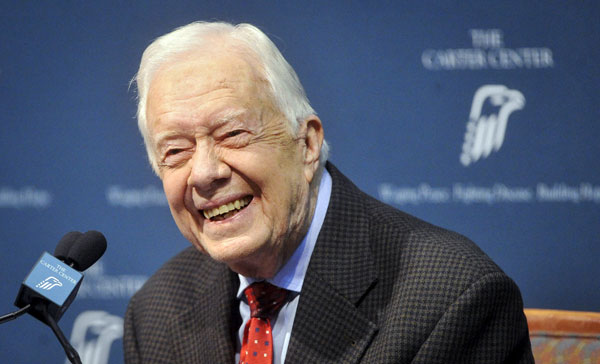Even with cancer, Carter remains an example
Updated: 2015-08-28 07:35
By Harvey Dzodin(China Daily)
|
||||||||
 |
|
Former US President Jimmy Carter takes questions from the media during a news conference about his recent cancer diagnosis and treatment plans, at the Carter Center in Atlanta, Georgia August 20, 2015.[Photo/Agencies] |
The news that former US president Jimmy Carter's cancer has spread to his brain is saddening. Even as a political appointee in the Carter administration, I cannot say he was a great president but he certainly is one of our most exemplary former presidents. By fully disclosing his condition he continues to lead by example, as he has done before.
Carter had a number of success stories on the domestic front: the creation of Cabinet-level federal departments of education and energy, and the installation of solar panels in the White House during the energy crisis to set an example. But during his term, there was widespread domestic malaise, too: inflation rose to 13.5 percent and the prime lending rate to 20 percent.
On the international front, he led the Camp David discussions which culminated in a peace treaty between Egypt and Israel, an event as astounding as former president Richard Nixon's visit to China in 1972. And in an act of great political courage, he returned the Panama Canal to Panama, thereby erasing one large vestige of 19th century American gunboat diplomacy.
But he was unable to get Congress to ratify the SALT II arms limitation treaty. Worst, the Iranian hostage crisis ended in the bungled rescue attempt called Operation Eagle Claw, in which eight Americans were killed. The hostages were released by Iran only in the first minutes after Ronald Reagan assumed office as president. I believe that had the rescue been successful, Carter could have been re-elected.
But to me, Carter's crowning achievement was shepherding to reality a new era of Sino-American relations. It must be remembered that while Nixon and former US secretary of state Henry Kissinger opened the door, it was Carter and his national security advisor Zbigniew Brzezinski who steered the implementation of full diplomatic relations.
- Former US President Jimmy Carter to be treated for brain cancer
- At 90, Jimmy Carter reflects on his rich life, and China doings
- Carter: US to put military equipment in 6 European countries
- US Senate approves Carter as new defense secretary
- US-China differences far outweighed by common interests: Carter
- Carter lauds progress, asks patience
- Carter: Sino-US ties most crucial
- Global health entering new era: WHO chief
- Brazil's planning minister steps aside after recordings revelation
- Vietnam, US adopt joint statement on advancing comprehensive partnership
- European border closures 'inhumane': UN refugee agency
- Japan's foreign minister calls A-bombings extremely regrettable
- Fukushima impact unprecedented for oceans: US expert

 Stars of Lijiang River: Elderly brothers with white beards
Stars of Lijiang River: Elderly brothers with white beards
 Wealthy Chinese children paying money to learn British manners
Wealthy Chinese children paying money to learn British manners
 Military-style wedding: Fighter jets, grooms in dashing uniforms
Military-style wedding: Fighter jets, grooms in dashing uniforms
 Striking photos around the world: May 16 - May 22
Striking photos around the world: May 16 - May 22
 Robots help elderly in nursing home in east China
Robots help elderly in nursing home in east China
 Hanging in the air: Chongqing holds rescue drill
Hanging in the air: Chongqing holds rescue drill
 2.1-ton tofu finishes in two hours in central China
2.1-ton tofu finishes in two hours in central China
 Six things you may not know about Grain Buds
Six things you may not know about Grain Buds
Most Viewed
Editor's Picks

|

|

|

|

|

|
Today's Top News
Liang avoids jail in shooting death
China's finance minister addresses ratings downgrade
Duke alumni visit Chinese Embassy
Marriott unlikely to top Anbang offer for Starwood: Observers
Chinese biopharma debuts on Nasdaq
What ends Jeb Bush's White House hopes
Investigation for Nicolas's campaign
Will US-ASEAN meeting be good for region?
US Weekly

|

|







